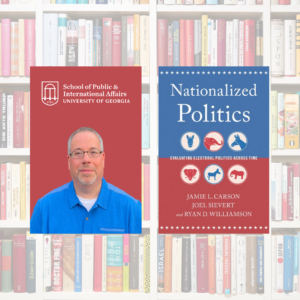
Dr. Jamie L. Carson, UGA Athletic Associate Professor in Public and International Affairs, co-authored a book entitled Nationalized Politics: Evaluating Electoral Politics Across Time, in which they assess the effect of American nationalization on electoral outcomes. Dr. Carson further illuminates the scope of his book in his answers to the questions below.
What influenced you to research nationalization in United States elections?
Almost a decade ago, I read an article about how elections in the United States were becoming increasingly nationalized, which was reducing the advantage that incumbents typically possess in congressional elections. By nationalization, I mean a phenomenon where top-down forces such as presidential vote choice or partisanship are informing voter’s decisions at the polls instead of more candidate-specific or local factors. Or, said differently, voters care more about which party controls the federal government and less about which candidates are best equipped to represent them and their district.
In working with two former UGA graduate students (who are coauthors on the book), we came to recognize that nationalization was permeating our electoral system today much like it did during the nineteenth century prior to the adoption of the Australian (secret) ballot. However, unlike elections of the past that largely were driven by the type of ballot that was then in use, nationalization today appears to be a function of the types of electoral campaigns that parties are coordinating on behalf of candidates and the behavior of presidents who are increasingly playing the role of “nationalizer in chief.”
Are there any hallmarks in American history that have made nationalization what it is today?
As noted previously, elections during the nineteenth century were largely nationalized as a result of the electoral system in place. When voters went to the polls, they chose either the Democratic or Republican ballot, leading them to vote a straight party ticket since their choices were largely constrained by the electoral system in place prior to the adoption of the secret ballot in the 1890s. In the modern era, voters can freely choose among both parties’ candidates via the office bloc ballot that is commonly used by the states, but the national rhetoric surrounding campaigns tends to focus on national issues reflecting the candidates at the top of the ticket (e.g., the president). This leads to candidates focusing less on local concerns or factors and more on issues that are relevant on the national stage. In other words, elections today are nationalized like they were in the nineteenth century despite the absence of an electoral system that promoted such behavior in political campaigns.
What recommendations would you make for voters in this political climate?
When one is voting, it is relatively easy to fall back on traditional cues or heuristics such as party affiliation when selecting between candidates, especially when we are asked to vote for a large number of candidates on a typical ballot. Although it does require a bit more effort, it is useful for voters to research the candidates running for the various offices and find out what they stand for separate from their party affiliation. This way, we can ensure that we are considering factors beyond the national rhetoric from presidents or the national party organizations given that local factors matter as much if not more than often what is happening on the national stage.
Where are we heading? What is the prognosis for a political climate driven by nationalization?
There is growing evidence that nationalization and polarization are linked and that if we continue on the current trajectory, the current levels of dysfunction and polarization are only going to get worse. As elections become more nationalized, the background of individual candidates matters less. This, in turn, means that factors such as political experience becomes less relevant when voters are selecting among candidates for elective office, making it easier for political amateurs to get elected. Since amateurs often tend to be more ideologically extreme than those candidates who have prior experience serving as city council members or state legislators, for instance, an increasing percentage of amateurs serving in Congress leads to more polarizing behavior. This is exactly what has been happening in Congress during the past few decades when fewer moderates are running and winning compared to the past, leading more ideologically extreme candidates to compete and win by default.
What are the main takeaways a reader can expect from your book and why is it important?
The main points we want readers to take away from our book is to better understand why we are seeing high levels of nationalization in the modern era and how these levels of nationalization are both similar and different to what we experienced during the latter half of the nineteenth century. In that era, many of the progressive reforms that were adopted in the early twentieth century played a crucial role in reducing that nationalization and the greater levels of polarized politics that accompanied it as well. Although electoral reforms are one possible solution to the increased nationalization we are experiencing today, we may need to think creatively about other options to reduce the nationalized rhetoric that is affecting our political system and the ability of politicians to address the numerous problems facing our nation.







